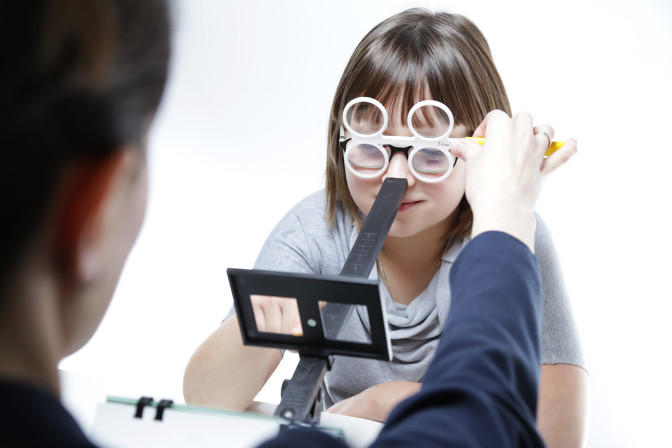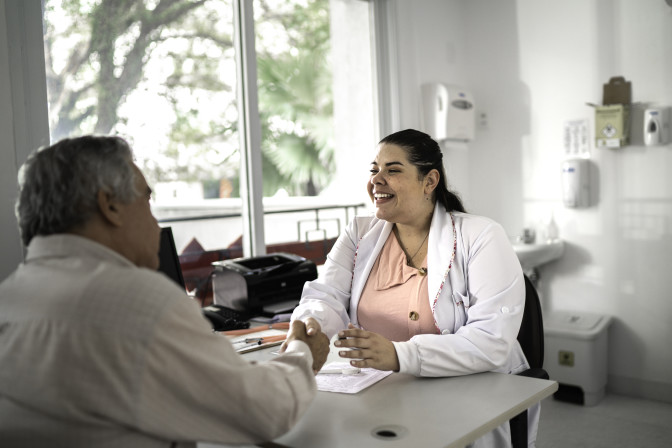50% OFF a Complete Pair of Glasses
*Restrictions apply. Click here for details.
Riverview Vision Performance Center
Columbus OH Vision Therapy

Clarkson Eyecare Riverview Vision Performance Center offers an innovative, “whole-person” therapeutic approach unique to Central Ohio through the integration of :
Vision Therapy
Neuro-Optometric Therapy
Occupational Therapy
Sensory Processing Therapy
Sports Vision Therapy
Changing Lives Through the Integration of Vision Therapy, Neuro & Developmental Optometry, and Occupational Therapy

Therapy is structured as a performance enhancement program focusing on the needs of children and adults. Individuals are evaluated and will participate in therapy sessions customized and led by our in-house team of Doctors and Occupational Therapists.
5 Ways That Riverview Vision Performance Center Can Help Restore Vision
Vision Therapy
Vision Therapy is the science of applying proven methods and techniques that correct or enhance vision skills or other visual deficits when corrective lenses or surgery is not indicated.
Vision is a 3 Step Process:
Your eyes see.
Your brain processes what you see
Your body reacts to what has been visually processed.
20/20 Vision is may not be enough.
Vision Therapy is an individualized treatment program designed to develop efficient visual skills in which we help develop, retrain or rehabilitate the eyes, brain, and body to work more efficiently together as a team. This includes the brain’s ability to control:
Eye alignment
Eye tracking and eye teaming
Eye focusing abilities
Eye movement control
Visual processing
Vision therapy often removes visual roadblocks that interfere with academic achievement. Common complaints are:
Skipping words or lines while reading
Below grade level reading
Reversals of letters or numbers
Constant rubbing of eyes or closing one eye when reading
Eyestrain or fatigue
Headaches with school work or computer use
Decreased reading comprehension
Blurred or double vision
Avoiding homework
When the causes of the visual problems are addressed using vision therapy, children can make remarkable improvements in their academic work.
Vision therapy is not just for children. Many college students and adults have also seen great improvement and relief from headaches, difficulty concentrating, eye strain/fatigue, losing one’s place while reading.
Neuro Optometric Rehabilitation
Neuro-optometric rehabilitation is an individualized treatment program for patients with visual deficits as a direct result of a neurological insults or disabilities such as:
Concussion (have a specific link to a Concussion page and the visual problems)
Traumatic brain injury
Stroke
Birth trauma
Chemical trauma
Parkinson's
These vision changes can be debilitating and make it difficult for individuals to perform activities such as reading, writing, working, driving, ambulating, and coordinating other daily activities.
As part of an interdisciplinary approach, neuro-optometric rehabilitation therapy targets the underlying cause of the symptoms listed above working to strengthen the neural connections between the eyes and the brain. This type of therapy focuses on rehabilitating the visual skills necessary for everyday activities.
Neuro-optometric rehab can be effective in improving the following conditions:
Double vision
Binocular vision dysfunction (Eye teaming or Eye tracking problems)
Convergence or accommodation difficulties
Visual perception deficits
Light Sensitivity
Visual Field Loss
Spatial Mis-judgements
Poor Depth Perception
Occupational Therapy
Occupational therapy is a healthcare profession that involves helping children, adolescents or adults to develop, recover, or maintain the meaningful activities, or occupations, of their patients. Occupational therapists treat patients who have injuries, illnesses, disabilities, or developmental needs that may impact their physical, sensory, cognitive, or social emotional skill level in their daily activities.
Our expert occupational therapists are trained in a variety of specialized ways and bring decades of experience to our patients. Whether working with children or the adult population, we strive to enhance visual skills and sensory-motor processing to help our patients reach their maximum potential and achieve what many feel was not possible.
Pediatrics: Our highly-trained occupational therapists help develop necessary physical, cognitive, and sensory motor skills to perform daily tasks more independently. We help kids learn how to respond to a sensory rich environment whether engaged in school, playing with friends or simply enjoying life. Since children don’t like to just sit in therapy, our OT’s strive to make therapy sessions feel like play with loads of movement and creative games. By participating in motivating activities, children are developing necessary skills while having fun!
Adults: Brain injuries and insults can be life changing. Our team of expert neuro-optometric occupational therapists support the rehabilitation process by providing specialized vision and multi-sensory therapies that help our patients regain skills and re-enter life in a gradual yet successful manner. Our expert team brings years of specialized skill and compassion to patients who need it the most. We welcome the opportunity to be part of your recovery team!
Sensory Processing Therapy
Sensory integration therapy was developed in the 1970s by an Occupational Therapist, Jean Ayres. Sensory integration or sensory processing therapy aims to help children or adults with sensory processing issues (which some people may refer to as “sensory integration disorder”) by exposing them to sensory stimulation in a structured, repetitive way. The theory behind it is that over time, the brain will adapt and allow kids to process and react to sensations more efficiently.
At the Vision Performance Center, we specialize in providing treatment that is multi-sensory based, dependent on the individual’s specific needs and desired outcomes. We utilize multiple therapy tools (i.e. swings, trampolines, therapy balls, balance discs, etc) to work on visual, vestibular, proprioceptive, auditory, and tactile processing. One of our most unique tools, OMST, is brought to us by our own Dr. Steven Curtis.
Sports Vision Therapy
Athletes of all sports are now turning to Sports Vision Training to gain a competitive edge over the competition. Sports Vision Training (SVT) advances your game by improving the essential visual skills needed to make split-second decisions in your sport. By increasing visual skills like depth perception, visual processing, and reaction speed, SVT helps transform a high performing athlete into an exceptional competitor. Sharper, more efficient vision skills give you that “winning edge” in your sport.
Sports Vision Training includes the following aspects of vision and motor abilities:
Visual acuity, or clarity of vision, is an important vision skill virtually in every sport. It helps you in judging the distance of the ball.
Dynamic visual acuity is the ability to clearly see moving objects and players, while vision pursuit enables you to follow them accurately. In fast-moving sports when you’re keeping track of the action, you rely on your dynamic visual acuity and vision pursuit skills.
Depth perception is your ability to quickly and accurately judge the distance and speed of objects or players. How your hands, feet and body respond to visual information is called eye/hand/body coordination.
Visualization is a technique that involves picturing something in your “mind’s eye” while your eyes are seeing and concentrating on something else - usually the ball.
Visual concentration is your ability to control your visual system for better awareness and less distraction.
Visual tracking is the ability to move your eyes from spot to spot while maintaining focus on the object we are looking at. Improving visual tracking advances the athlete’s reaction time, speed, and fluidity within their sport.
Visual reaction time refers to the amount of time it takes for environmental stimuli to travel from our vision system into your motor system to produce a physical reaction. Improving visual reaction time helps you improve you response time by training the brain to work more efficiently.
Schedule Optometric Vision Therapy from Clarkson Eyecare Today

Schedule an appointment with Clarkson Eyecare for a treatment program for optometric vision therapy.
Schedule your optometric vision therapy appointment today to help improve the overall function of your eyes.
Frequently Asked Questions About Vision Therapy
Children or Adults with:
Concussions/Brain Trauma
Reading or Learning Difficulties
Developmental Delays
Sensory Processing Disorder/Delays
Dyslexia
Poor Coordination
Lazy Eye
Headaches
Eye fatigue
A desire to enhance Sports Performance
The Riverview Vision Performance Center provides this unique approach focusing on the integration of vision, sensory processing, and motor skills, providing patients a way to learn how to effectively utilize their visual and sensory motor skills for everyday activities.
Benefits May Include Improved:
Reading
Writing
Eye Hand Coordination
Body Awareness
Balance
Attention/Organization
Clarkson Eyecare Riverview Vision Performance Center fosters growth in the following skill areas to help maintain and restore healthy vision:
Functional vision is your ability to move, team and focus your eyes to gather information from the world around you. These skills can become impaired after a neurological insult or perhaps they were underdeveloped from birth. These skills include:
Eye alignment
Eye tracking and eye teaming
Eye focusing abilities
Eye movement control
Visual processing
Studies indicate that 30 to 60% of children with learning delays have vision problems. Most of these children have passed the standard vision screening at school or at the pediatrician’s office, testing only a child’s visual acuity. Often it is the child’s functional vision skills that are the actual roadblocks to learning.
Sensory Processing is the ability to receive, organize, interpret, and utilize information from the world around us. When our systems are processing information and communicating effectively, our bodies can achieve a calm, organized state to efficiently attend to activities. Efficient sensory processing skills allow us to attend to, organize, sequence, problem solve, and execute activities appropriately. Sensory integration is a therapeutic approach used in conjunction with functional skill development to help children and adults process and respond to stimuli in their environment.
Sensory motor skills are basic underlying skills that influence learning, behavior and performance. Skills such as motor planning, crossing midline, body awareness, fine motor skills, gross motor skills, and bilateral coordination rely heavily on vision and other sensory stimulation. To achieve good motor skill development, an individual must have good awareness of his/her own body and the space around them. During therapy, we assess and help patients re-visit and achieve milestones that may not be fully developed or have gotten disrupted from an accident or illness, giving them the foundation they need to achieve age-appropriate skill development or acquisition for desired performance.
